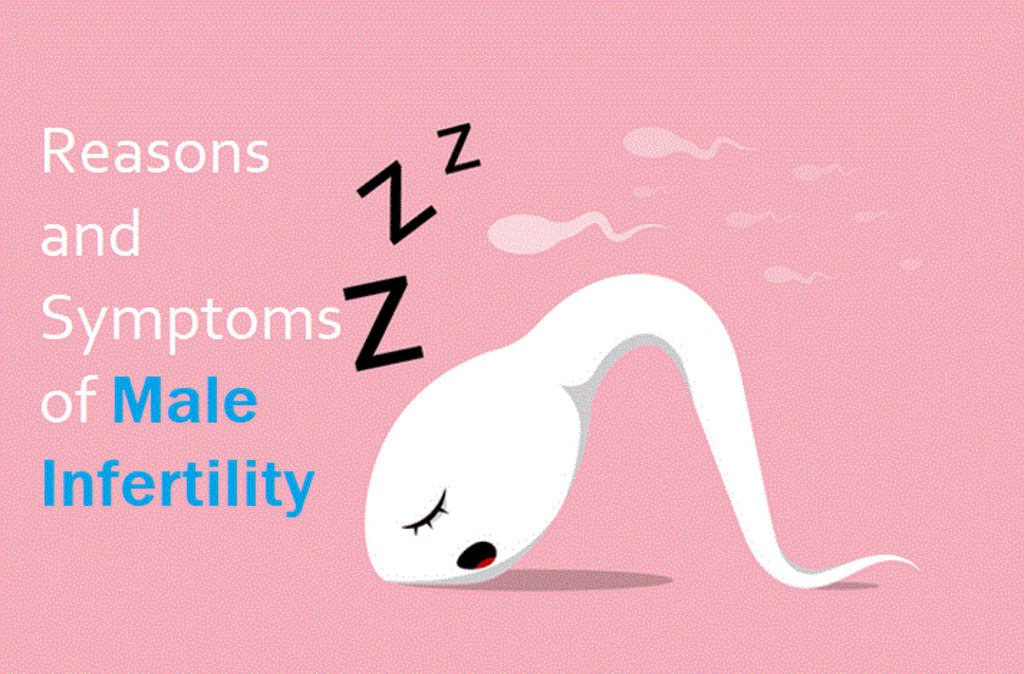Male Infertility: Causes, Diagnosis, and Treatments
Understanding the Factors Affecting Male Fertility and the Path to Parenthood

Male infertility refers to the inability of a man to impregnate a female partner despite regular and unprotected sexual intercourse. It is a widespread issue affecting many couples worldwide. Several factors can contribute to male infertility, some of which include:
1. Sperm Abnormalities: Abnormal sperm morphology (shape) or low sperm count can reduce the chances of successful fertilization.
2. Varicocele: A varicose vein in the testicles can lead to overheating of the testicles, affecting sperm production.
3. Hormonal Imbalances: Problems with hormone production, especially testosterone and gonadotropins, can impact sperm production and maturation.
4. Genetic Factors: Inherited genetic abnormalities can affect sperm quality and quantity.
5. Testicular Injury or Disease: Trauma to the testicles, such as from sports injuries or infections, can impair sperm production.
6. Sexual Dysfunction: Difficulties in ejaculating or maintaining an erection can hinder conception.
7. Lifestyle Factors: Unhealthy lifestyle choices, such as smoking, excessive alcohol consumption, drug use, and obesity, can negatively impact fertility.
8. Environmental Factors: Exposure to certain chemicals, toxins, or excessive heat can harm sperm production.
9. Medical Conditions: Certain medical conditions, such as diabetes, cystic fibrosis, and retrograde ejaculation, can lead to male infertility.
10. Age: Although less pronounced than in women, advancing age can reduce sperm quality and fertility.
"My husband thinks he's 'shooting blanks,' but I told him it's more like shooting slow-motion replays." 🎥
Diagnosing male infertility typically involves a physical examination, semen analysis, hormonal testing, and sometimes genetic testing. Fortunately, many cases of male infertility can be treated, depending on the underlying cause. Treatments may include:
1. Lifestyle Changes: Adopting a healthy lifestyle can significantly improve sperm quality. This includes regular exercise, a balanced diet, and avoiding harmful habits like smoking and excessive alcohol consumption.
2. Medications: Hormonal imbalances can be treated with medications to stimulate sperm production.
3. Surgery: Surgical interventions can correct certain issues, such as varicoceles or blockages in the reproductive tract.
4. Assisted Reproductive Techniques: In vitro fertilization (IVF) and intracytoplasmic sperm injection (ICSI) are options for severe male infertility cases.
5. Counseling: For cases involving psychological factors, counseling may be beneficial.
It is essential for both partners to undergo fertility evaluations when experiencing difficulty conceiving. Male infertility should not be overlooked, as it plays a significant role in many cases of infertility among couples. Seeking professional advice from a qualified healthcare provider or fertility specialist is crucial to determine the best course of action based on individual circumstances.
"My husband thinks he's 'shooting blanks,' but I told him it's more like shooting slow-motion replays." 🎥
Let's delve into more details about male infertility and its causes:
1. Sperm Abnormalities: Sperm abnormalities can encompass various issues, including reduced motility (the ability of sperm to move effectively), poor morphology (abnormal sperm shape), and low sperm count (oligospermia). These factors can significantly impact the ability of sperm to reach and fertilize the egg.
2. Varicocele: A varicocele is a condition where the veins within the scrotum become enlarged. This can increase the temperature in the testicles, affecting sperm production and quality.
3. Hormonal Imbalances: Hormones like follicle-stimulating hormone (FSH) and luteinizing hormone (LH) play vital roles in sperm production. Any disruptions in hormone levels can lead to reduced sperm production (oligospermia) or complete absence of sperm (azoospermia).
"I told my husband we needed to 'work on our fertility.' He thought I meant spending more time in the garden!" 🌱👨🌾
4. Genetic Factors: Genetic abnormalities can be inherited or acquired, and they may impact sperm production, motility, or structural integrity. Conditions like Klinefelter syndrome and Y chromosome deletions are examples of genetic causes of male infertility.
5. Testicular Injury or Disease: Trauma to the testicles, such as from accidents or infections like mumps orchitis, can impair sperm production. Certain sexually transmitted infections may also lead to fertility issues.
6. Sexual Dysfunction: Erectile dysfunction (impotence) or problems with ejaculation, such as premature ejaculation or retrograde ejaculation (where semen enters the bladder instead of being ejaculated), can hinder successful conception.
7. Lifestyle Factors: Unhealthy habits like smoking, excessive alcohol consumption, and drug use can adversely affect sperm quality and fertility. Additionally, obesity and poor dietary choices may contribute to male infertility.
8. Environmental Factors: Exposure to environmental toxins, pesticides, heavy metals, and radiation can harm sperm production and function.
9. Medical Conditions: Certain medical conditions, such as diabetes, cystic fibrosis, and immune system disorders, can affect fertility.
10. Age: While not as pronounced as in women, advancing age can lead to decreased sperm quality and fertility.
11. Obstruction of the Reproductive Tract: Blockages in the tubes that carry sperm (vas deferens) can prevent sperm from being ejaculated properly, leading to infertility. This can result from infections, prior surgeries, or congenital abnormalities.
12. Autoimmune Disorders: Sometimes, the body's immune system mistakenly attacks its own sperm, leading to reduced sperm motility or function.
13. Medications: Certain medications, such as those used for cancer treatment, can interfere with sperm production or function.
14. Occupational Hazards: Some occupations expose individuals to harmful substances or high levels of heat, potentially affecting fertility.
15. Emotional Stress: Prolonged stress and anxiety may impact hormone levels and sperm production.
16. Weight Issues: Both underweight and overweight men may experience fertility problems due to hormonal imbalances.
17. Radiation and Chemotherapy: Cancer treatments involving radiation or chemotherapy can damage sperm production and affect fertility.
18. Heat Exposure: Frequent exposure to high temperatures, such as from hot baths, saunas, or prolonged sitting, may affect sperm production.
19. Uncontrolled Diabetes: Poorly managed diabetes can lead to erectile dysfunction and reduced sperm quality.
20.Substance Abuse: Illicit drug use, including anabolic steroids, can negatively impact fertility.
21. Excessive Exercise: Intense and prolonged physical activity might affect hormone levels and sperm production.
22. Environmental Endocrine Disruptors: Exposure to certain chemicals in the environment can disrupt hormonal balance and fertility.
23. Smoking: Smoking can damage sperm DNA, reduce sperm count, and impair sperm motility.
24. Inflammation and Infections: Inflammation of the testicles or prostate, as well as infections like sexually transmitted infections, can harm sperm production.
25. Exposure to Pesticides and Chemicals: Certain chemicals found in pesticides and industrial settings may affect male fertility.
26. Ejaculatory Duct Obstruction: Blockages or abnormalities in the ejaculatory ducts can hinder the release of sperm during ejaculation.
27. Idiopathic Infertility: In some cases, the exact cause of male infertility remains unknown, and it is termed "idiopathic infertility."
28. Sexually Transmitted Infections (STIs): Certain STIs, such as chlamydia and gonorrhea, can lead to inflammation and scarring of the reproductive organs, affecting fertility.
29. Chromosomal Abnormalities: Genetic conditions like Klinefelter syndrome (XXY chromosomes) or Y chromosome microdeletions can impact male fertility.
"My sperm count is so low, it's more like a sperm suggestion." 😄
30. Vasectomy: Although considered a permanent method of contraception, vasectomy can sometimes be reversed through surgical procedures to restore fertility.
31. Chronic Illnesses: Conditions like chronic kidney disease or liver disease may interfere with hormonal balance and sperm production.
32. Immunological Factors: Some men produce antibodies that attack their own sperm, affecting sperm motility and function.
33. Prescription Medications: Certain medications used for hypertension, depression, and other conditions can have adverse effects on male fertility.
34. Exposure to Heavy Metals: Prolonged exposure to heavy metals like lead, cadmium, and mercury may impact sperm quality.
35. Anabolic Steroid Use: Abuse of anabolic steroids for bodybuilding or athletic performance can suppress natural testosterone production and lead to infertility.
36. Undescended Testicles: If one or both testicles fail to descend properly into the scrotum during fetal development, it can affect sperm production.
37. Chemical Exposure: Exposure to chemicals in workplaces such as factories or laboratories might have adverse effects on male fertility.
38. Hypothalamic or Pituitary Dysfunction: Problems with the hypothalamus or pituitary gland can disrupt hormonal signaling necessary for sperm production.
39. Unhealthy Diet: Poor dietary habits, including nutrient deficiencies, may negatively impact sperm health.
40. Radiation Exposure: Exposure to high levels of radiation, such as in cancer treatments or certain occupations, can harm sperm production.
41. Retrograde Ejaculation: In this condition, semen flows backward into the bladder instead of being expelled during ejaculation, leading to infertility.
42. Alcohol Consumption: Heavy or excessive alcohol intake can disrupt hormone levels and sperm production.
43. Tumors and Cancers: Testicular tumors and cancers, as well as treatments like radiation and chemotherapy, can impact male fertility.
44. Thyroid Disorders: Thyroid dysfunction can affect reproductive hormone levels and sperm production.
45. Psychological Factors: Stress, anxiety, and depression can influence male fertility through hormonal changes and reduced sexual function.
46. Heat Exposure: Frequent use of hot tubs, saunas, or laptops placed on the lap can raise testicular temperature and affect sperm quality.
47. Medications for Hair Loss: Certain medications used to treat male pattern baldness, like finasteride, may cause temporary infertility.
48. Exposure to Bisphenol A (BPA): BPA, found in some plastics and food packaging, has been associated with reduced sperm quality.
49. Medications for Hypertension: Some antihypertensive medications may have negative effects on sperm production.
50. Chemotherapy and Bone Marrow Transplantation: Cancer treatments like high-dose chemotherapy and bone marrow transplantation can severely impact sperm production.
51. Aging: Although men can remain fertile for much of their lives, sperm quality may decline with age.
52. Inadequate Sexual Frequency: Not having regular intercourse during the fertile window can reduce the chances of conception.
53. Inflammatory Conditions: Systemic or chronic inflammatory diseases may affect sperm quality and fertility.
54. Autoimmune Orchitis: Inflammation of the testicles caused by the body's immune system can damage sperm-producing cells.
55. Sedentary Lifestyle: Lack of physical activity and prolonged sitting may influence sperm quality.
56. Exposure to Radiation: High levels of radiation from sources like X-rays or occupational exposure can harm sperm production.
57. Processed Foods: A diet high in processed foods and trans fats may negatively impact fertility.
58. Obesity-related Hormonal Changes: Obesity can lead to hormonal imbalances that affect sperm production.
59. Use of Recreational Drugs: Illicit drug use, including marijuana and cocaine, can interfere with sperm production and function.
60. Anxiety about Fertility: Stress and anxiety related to infertility may exacerbate the problem through hormonal disturbances.
Understanding the various factors that can contribute to male infertility is essential for identifying potential solutions and improving fertility outcomes. For couples facing challenges with conception, seeking support from healthcare professionals, such as urologists or fertility specialists, can provide valuable guidance and personalized treatment plans.
Remember, every individual's situation is unique, and the right approach to managing male infertility will depend on the specific underlying causes. By addressing lifestyle factors, seeking medical intervention, and exploring assisted reproductive techniques, many couples can overcome male infertility and increase their chances of achieving a successful pregnancy.
"The only swimmers my husband's got are the ones he wears in the pool." 😄
Natural remedies for male infertility may complement medical treatments and lifestyle adjustments. While they may not be a substitute for professional medical advice, the following natural remedies have been suggested to support male reproductive health:
1. Nutritious Diet:
Consuming a balanced diet rich in fruits, vegetables, whole grains, and lean proteins can provide essential nutrients for sperm production and overall reproductive health. Include foods high in antioxidants, such as vitamin C, vitamin E, zinc, and selenium, to help protect sperm from oxidative damage.
2. Maintain a Healthy Weight:
Achieving and maintaining a healthy weight through regular exercise and proper nutrition can positively influence hormone levels and fertility.
3. Supplements:
Some natural supplements like coenzyme Q10, L-carnitine, and folic acid have been associated with improved sperm health. However, it's crucial to consult a healthcare professional before starting any supplements to ensure safety and appropriate dosages.
4. Herbal Remedies:
Certain herbs, such as ashwagandha, maca root, and ginseng, have been traditionally used to support male fertility. Research suggests they might have positive effects on sperm parameters, but more studies are needed for conclusive evidence.
5. Reduce Stress:
Chronic stress can disrupt hormone levels and affect sperm production. Practicing relaxation techniques like meditation, yoga, or deep breathing can help reduce stress and promote overall well-being.
6. Avoid Excessive Heat:
Minimize exposure to high temperatures, such as hot baths, saunas, and prolonged use of laptops on the lap, as they can raise testicular temperature and affect sperm quality.
7. Quit Smoking and Limit Alcohol:
Smoking and excessive alcohol consumption have been linked to reduced sperm count and motility. Quitting smoking and moderating alcohol intake can benefit reproductive health.
8. Limit Exposure to Environmental Toxins:
Reduce exposure to pesticides, heavy metals, and chemicals known to disrupt hormone balance and negatively impact fertility.
9. Regular Sexual Activity:
Regular intercourse during the fertile window can increase the chances of successful conception.
10. Maintain Testicular Health:
Avoid wearing tight underwear or pants for extended periods, as this may increase scrotal temperature and affect sperm production.
11. Exercise Moderately:
Engage in regular moderate-intensity exercise, as excessive exercise may negatively impact fertility.
"I tried to motivate my husband's little swimmers by shouting, 'Faster! Stronger!' but they just gave me a blank stare." 😆
It's essential to remember that individual responses to natural remedies can vary, and not all remedies may be effective for everyone. If a couple is struggling with infertility, seeking guidance from a healthcare provider or a fertility specialist is crucial. They can assess the specific factors contributing to male infertility and recommend appropriate treatments, lifestyle changes, or complementary approaches to improve the chances of conception.
About the Creator
Go With Trend
"Express, Connect, Impact - Welcome to "Go With Trend"!
Discover the magic of Letters on our vibrant platform. 🎙️ Share stories, sing your heart out, and connect with a global audience. 🌍 Unleash your creativity today! ✨ #"Go With Trend"






Comments
There are no comments for this story
Be the first to respond and start the conversation.